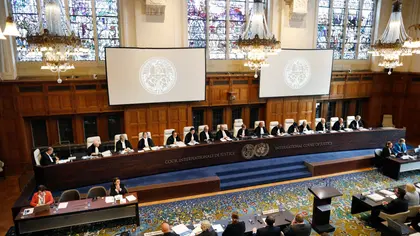Russia and Ukraine will face off at the International Court of Justice from Monday over Moscow’s claim of “genocide” in eastern Ukraine as a pretext for last year’s invasion.
Representatives from the two warring nations will go head-to-head at the sumptuous Peace Palace in The Hague over whether the top UN court has the jurisdiction to order a halt to Russia’s ongoing military action.
JOIN US ON TELEGRAM
Follow our coverage of the war on the @Kyivpost_official.
When Russian President Vladimir Putin ordered the February 24, 2022 invasion, part of his reasoning was that pro-Russian people in eastern Ukraine had been “subjected to bullying and genocide by the Kyiv regime”.
Two days into the invasion, Ukraine filed suit at the ICJ, “emphatically denying” this and arguing that Russia’s use of “genocide” as a pretext went against the 1948 UN Genocide Convention.
In March 2022, the ICJ sided with Ukraine, ordering Russia to “immediately suspend” its military action.
But this judgement was a so-called “preliminary ruling”, pending a decision on whether the court is actually competent to rule on the content of the matter.
The court’s decisions are binding although it has no “police force” to enforce them.
According to Russia, the ICJ does not have jurisdiction because Ukraine’s case falls outside the scope of the UN Genocide Convention.
It will flesh out its reasoning further on Monday, with Ukraine’s response on Tuesday. It is the first time a Russian representative will address the court in this case, previously arguing that it had insufficient time to prepare arguments.

Trump’s Russia Plan – Will It Work? NATO, Putin & US Strategy Explained
More than 30 other countries -- all Western allies of Ukraine -- will also have the chance to make statements in support of Kyiv. The ICJ dismissed a bid by the United States to join the case.
The court, created after World War II to deal with disputes between UN member states when they cannot resolve matters themselves, could take months to decide whether it has jurisdiction.
The ICJ is also dealing with a separate case filed by Ukraine alleging that Russia backed separatist rebels in eastern Ukraine for years before the invasion.
You can also highlight the text and press Ctrl + Enter










